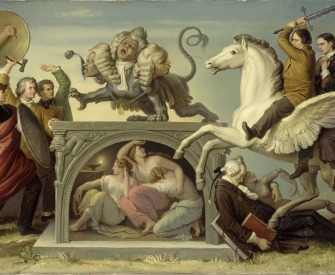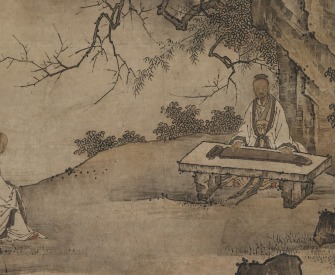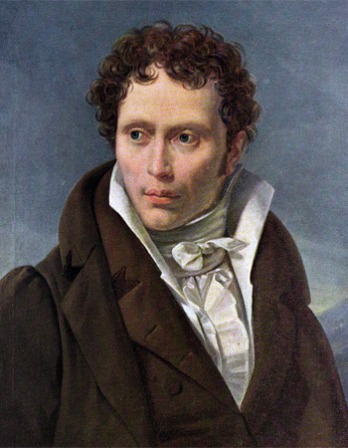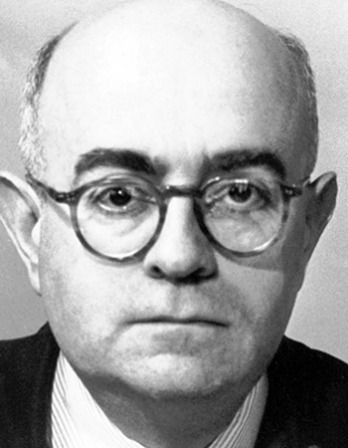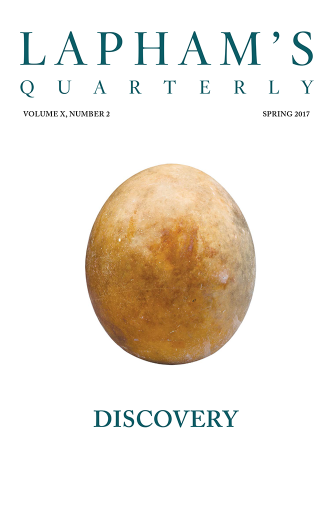People who’ve drunk neat wine don’t care a damn.
—Hipponax, 550 BCStaging a Symphony
Roald Dahl describes drunken delusions of grandeur.
Mr. Botibol opened the front door, went into the living room, and switched on the radio; then he sat down in a large leather chair, leaned back, and closed his eyes.
He didn’t feel exactly giddy, but there was a singing in his ears, and his thoughts were coming and going more quickly than usual. That solicitor gave me too much wine, he told himself. I’ll stay here for a while and listen to some music, and I expect I’ll go to sleep and after that I’ll feel better. They were playing a symphony on the radio. Mr. Botibol had always been a casual listener to symphony concerts, and he knew enough to identify this as one of Beethoven’s. But now, as he lay back in his chair listening to the marvelous music, a new thought began to expand slowly within his tipsy mind. It wasn’t a dream because he was not asleep. It was a clear conscious thought and it was this: I am the composer of this music. I am a great composer. This is my latest symphony and this is the first performance. The huge hall is packed with people—critics, musicians, and music lovers from all over the country—and I am up there in front of the orchestra, conducting.
Mr. Botibol could see the whole thing. He could see himself up on the rostrum dressed in a white tie and tails, and before him was the orchestra, the massed violins on his left, the violas in front, the cellos on his right, and back of them were all the woodwinds and bassoons and drums and cymbals, the players watching every movement of his baton with an intense, almost a fanatical reverence. Behind him, in the half darkness of the huge hall, was row upon row of white enraptured faces, looking up toward him, listening with growing excitement as yet another new symphony by the greatest composer the world has ever seen unfolded itself majestically before them. Some of the audience were clenching their fists and digging their nails into the palms of their hands because the music was so beautiful that they could hardly stand it. Mr. Botibol became so carried away by this exciting vision that he began to swing his arms in time with the music in the manner of a conductor. He found it was such fun doing this that he decided to stand up, facing the radio, in order to give himself more freedom of movement.
He stood there in the middle of the room, tall, thin, and dressed in his tight blue double-breasted suit, his small bald head jerking from side to side as he waved his arms in the air. He knew the symphony well enough to be able occasionally to anticipate changes in tempo or volume, and when the music became loud and fast he beat the air so vigorously that he nearly knocked himself over; when it was soft and hushed, he leaned forward to quiet the players with gentle movements of his outstretched hands; and all the time he could feel the presence of the huge audience behind him, tense, immobile, listening. When at last the symphony swelled to its tremendous conclusion, Mr. Botibol became more frenzied than ever, and his face seemed to thrust itself round to one side in an agony of effort as he tried to force more and still more power from his orchestra during those final mighty chords.
Then it was over. The announcer was saying something, but Mr. Botibol quickly switched off the radio and collapsed into his chair, blowing heavily.
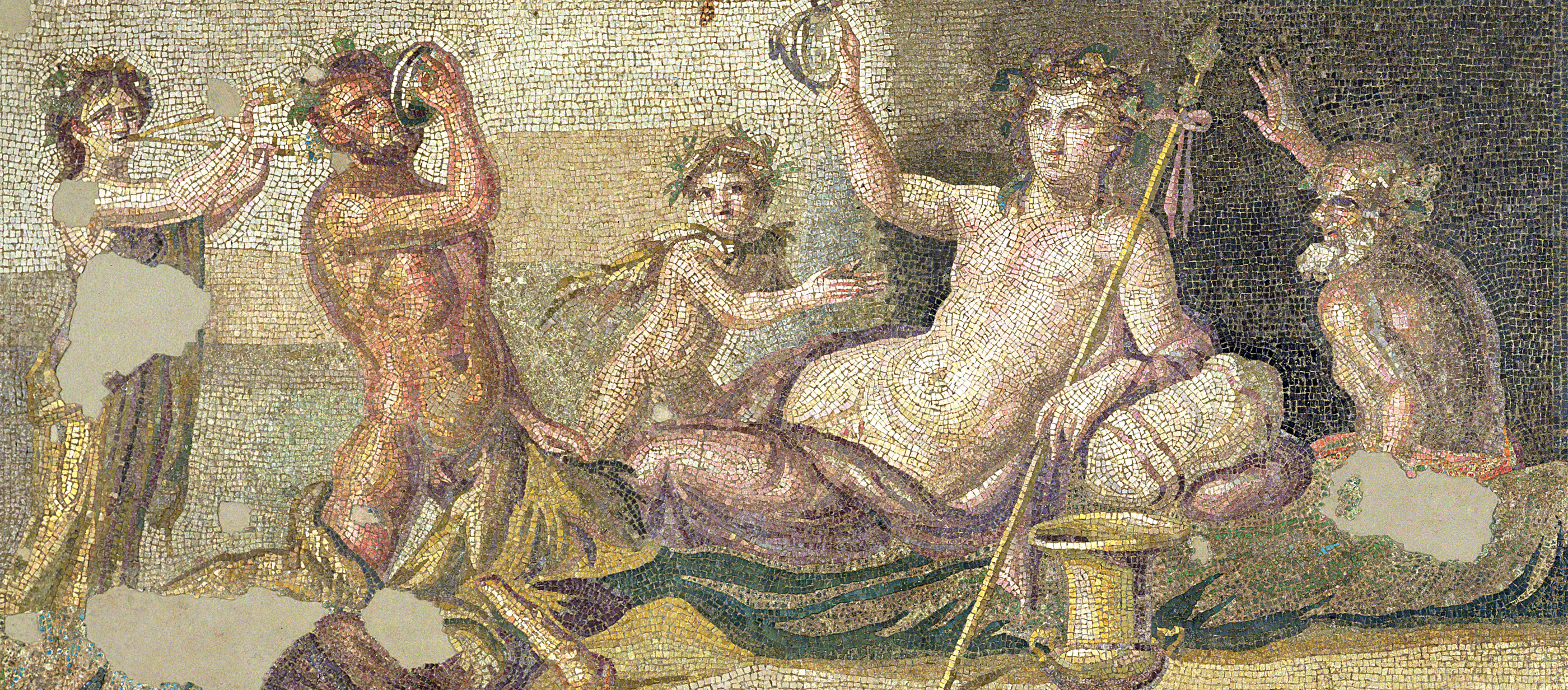
Drinking contest between Dionysos and Heracles, mosaic, Antioch, c. 100.
“Phew!” he said aloud. “My goodness gracious me, what have I been doing!” Small globules of sweat were oozing out all over his face and forehead, trickling down his neck inside his collar. He pulled out a handkerchief and wiped them away, and he lay there for a while, panting, exhausted, but exceedingly exhilarated.
“Well, I must say,” he gasped, still speaking aloud, “that was fun. I don’t know that I have ever had such fun before in all my life. My goodness, it was fun, it really was!” Almost at once he began to play with the idea of doing it again. But should he? Should he allow himself to do it again? There was no denying that now, in retrospect, he felt a little guilty about the whole business, and soon he began to wonder whether there wasn’t something downright immoral about it all. Letting himself go like that! And imagining he was a genius! It was wrong. He was sure other people didn’t do it. And what if the butler, Mason, had come in the middle and seen him at it! That would have been terrible!
He reached for the paper and pretended to read it, but soon he was searching furtively among the radio programs for the evening. He put his finger under a line which said “8:30. Symphony Concert. Brahms’ Symphony No. 2.” He stared at it for a long time. The letters in the word Brahms began to blur and recede, and gradually they disappeared altogether and were replaced by letters which spelled Botibol. Botibol’s Symphony No. 2. It was printed quite clearly. He was reading it now, this moment. “Yes, yes,” he whispered. “First performance. The world is waiting to hear it. Will it be as great, they are asking, will it perhaps be greater than his earlier work? And the composer himself had been persuaded to conduct. He is shy and retiring, hardly ever appears in public, but on this occasion he has been persuaded…”
Mr. Botibol leaned forward in his chair and pressed the bell beside the fireplace. Mason, the only other person in the house, ancient, small, and grave, appeared at the door.
“Er…Mason, have we any wine in the house?”
“Wine, sir?”
“Yes, wine.”
“Oh no, sir. We haven’t had any wine these fifteen or sixteen years. Your father, sir…”
“I know, Mason, I know, but will you get some, please. I want a bottle with my dinner.”
The butler was shaken. “Very well, sir, and what shall it be?”
“Claret, Mason. The best you can obtain. Get a case. Tell them to send it round at once.”
When he was alone again, he was momentarily appalled by the simple manner in which he had made his decision. Wine for dinner! Just like that! Well, yes, why not? Why ever not now he came to think of it? He was his own master. And anyway it was essential that he have wine. It seemed to have a good effect, a very good effect indeed. He wanted it, and he was going to have it, and to hell with Mason.
He rested for the remainder of the afternoon, and at seven thirty Mason announced dinner. The bottle of wine was on the table, and he began to drink it. He didn’t give a damn about the way Mason watched him as he refilled his glass. Three times he refilled it; then he left the table, saying that he was not to be disturbed and returned to the living room. There was quarter of an hour to wait. He could think of nothing now except the coming concert. He lay back in the chair and allowed his thoughts to wander deliciously toward eight thirty. He was the great composer waiting impatiently in his dressing room in the concert hall. He could hear in the distance the murmur of excitement from the crowd as they settled themselves in their seats. He knew what they were saying to each other. Same sort of thing the newspapers had been saying for months. Botibol is a genius, greater, far greater, than Beethoven or Bach or Brahms or Mozart or any of them. Each new work of his is more magnificent than the last. What will the next one be like? We can hardly wait to hear it! Oh yes, he knew what they were saying. He stood up and began to pace the room. It was nearly time now. He seized a pencil from the table to use as a baton, then he switched on the radio. The announcer had just finished the preliminaries, and suddenly there was a burst of applause, which meant that the conductor was coming onto the platform. The previous concert in the afternoon had been from gramophone records, but this one was the real thing. Mr. Botibol turned around, faced the fireplace, and bowed graciously from the waist. Then he turned back to the radio and lifted his baton. The clapping stopped. There was a moment’s silence. Someone in the audience coughed. Mr. Botibol waited. The symphony began.
Once again, as he began to conduct, he could see clearly before him the whole orchestra and the faces of the players and even the expressions on their faces. Three of the violinists had gray hair. One of the cellists was very fat, another wore heavy brown-rimmed glasses, and there was a man in the second row playing a horn who had a twitch on one side of his face. But they were all magnificent. And so was the music. During certain impressive passages, Mr. Botibol experienced a feeling of exultation so powerful that it made him cry out for joy, and once during the third movement, a little shiver of ecstasy radiated spontaneously from his solar plexus and moved downward over the skin of his stomach like needles. But the thunderous applause and the cheering which came at the end of the symphony was the most splendid thing of all. He turned slowly toward the fireplace and bowed. The clapping continued, and he went on bowing until at last the noise died away and the announcer’s voice jerked him suddenly back into the living room. He switched off the radio and collapsed into his chair, exhausted but very happy.
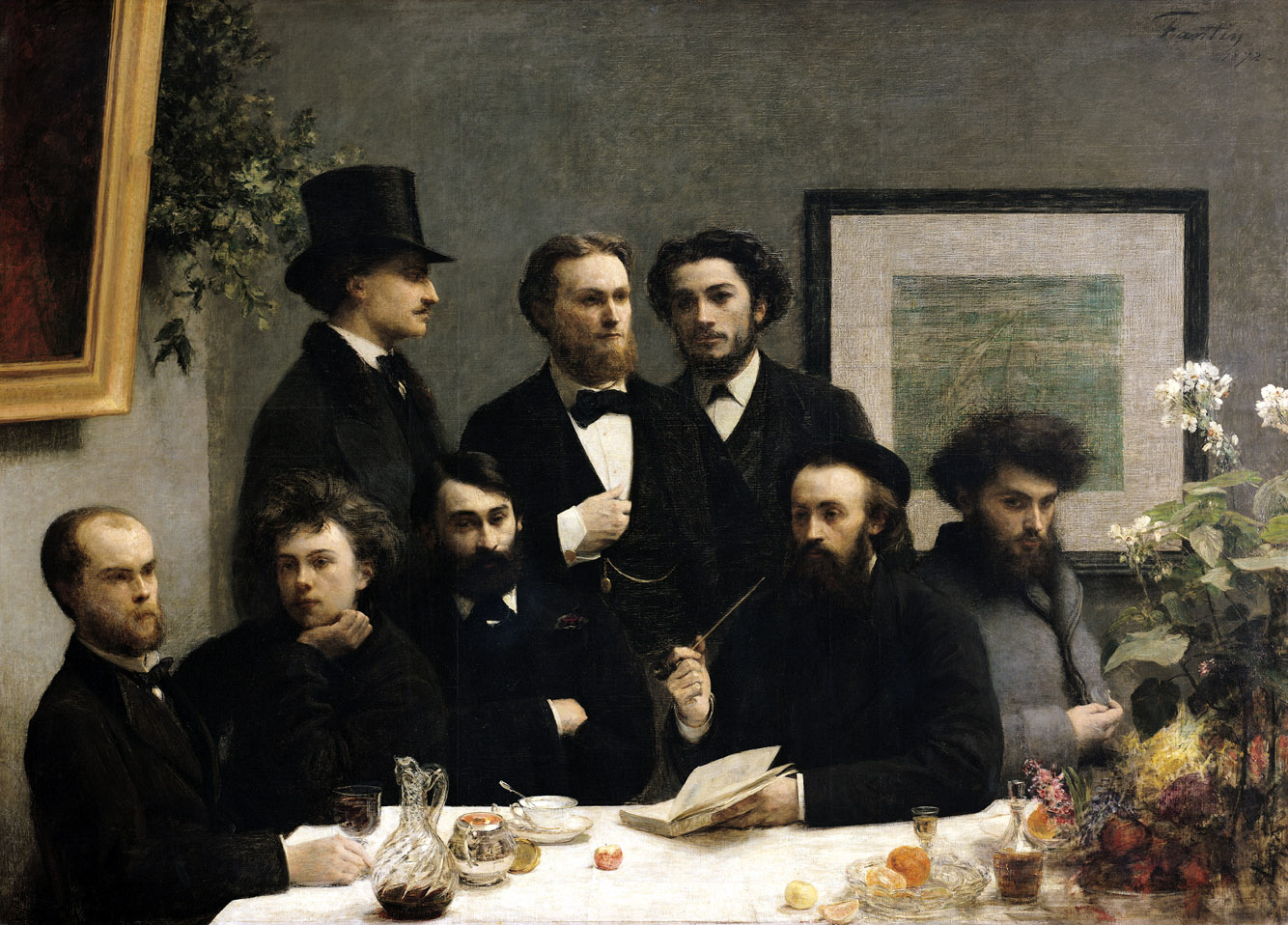
By the Table, by Henri Fantin-Latour, 1872. Musée d'Orsay, Paris.
As he lay there, smiling with pleasure, wiping his wet face, panting for breath, he was already making plans for his next performance. But why not do it properly? Why not convert one of the rooms into a sort of concert hall and have a stage and rows of chairs and do the thing properly? And have a gramophone so that one could perform at any time without having to rely on the radio program. Yes, by heavens, he would do it!
The next morning, Mr. Botibol arranged with a firm of decorators that the largest room in the house be converted into a miniature concert hall. There was to be a raised stage at one end and the rest of the floor space was to be filled with rows of red-plush seats. “I’m going to have some little concerts here,” he told the man from the firm, and the man nodded and said that would be very nice. At the same time he ordered a radio shop to install an expensive self-changing gramophone with two powerful amplifiers, one on the stage, the other at the back of the auditorium. When he had done this, he went off and bought all of Beethoven’s nine symphonies on gramophone records, and from a place which specialized in recorded sound effects he ordered several records of clapping and applauding by enthusiastic audiences. Finally, he bought himself a conductor’s baton, a slim ivory stick which lay in a case lined with blue silk.
In eight days the room was ready. Everything was perfect; the red chairs, the aisle down the center, and even a little dais on the platform with a brass rail running round it for the conductor. Mr. Botibol decided to give the first concert that evening after dinner.
At seven o’clock he went up to his bedroom and changed into white tie and tails. He felt marvelous. When he looked at himself in the mirror, the sight of his own grotesque figure didn’t worry him in the least. A great composer, he thought, smiling, can look as he damn well pleases. People expect him to look peculiar. All the same he wished he had some hair on his head. He would have liked to let it grow rather long. He went downstairs to dinner, ate his food rapidly, drank half a bottle of wine, and felt better still. “Don’t worry about me, Mason,” he said. “I’m not mad. I’m just enjoying myself.”
“Yes, sir.”
“I shan’t want you anymore. Please see that I’m not disturbed.” Mr. Botibol went from the dining room into the miniature concert hall. He took out the records of Beethoven’s First Symphony, but before putting them on the gramophone, he placed two other records with them. The one, which was to be played first of all, before the music began, was labeled prolonged enthusiastic applause. The other, which would come at the end of the symphony, was labeled sustained applause, clapping, cheering, shouts of encore. By a simple mechanical device on the record changer, the gramophone people had arranged that the sound from the first and the last records—the applause—would come only from the loudspeaker in the auditorium. The sound from all the others—the music—would come from the speaker hidden among the chairs of the orchestra. When he had arranged the records in the concert order, he placed them on the machine, but he didn’t switch it on at once. Instead he turned out all the lights in the room except one small one which lit up the conductor’s dais, and he sat down in the chair up on the stage, closed his eyes, and allowed his thoughts to wander into the usual delicious regions; the great composer, nervous, impatient, waiting to present his latest masterpiece, the audience assembling, the murmur of their excited talk, and so on. Having dreamed himself right into the part, he stood up, picked up his baton, and switched on the gramophone.
A tremendous wave of clapping filled the room. Mr. Botibol walked across the stage, mounted the dais, faced the audience, and bowed. In the darkness he could just make out the faint outline of the seats on either side of the center aisle, but he couldn’t see the faces of the people. They were making enough noise. What an ovation! Mr. Botibol turned and faced the orchestra. The applause behind him died down. The next record dropped. The symphony began.
Sobriety diminishes, discriminates, and says no; drunkenness expands, unites, and says yes.
—William James, 1902This time it was more thrilling than ever, and during the performance he registered any number of prickly sensations around his solar plexus. Once, when it suddenly occurred to him that the music was being broadcast all over the world, a sort of shiver ran right down the length of his spine. But by far the most exciting part was the applause which came at the end. They cheered and clapped and stamped and shouted Encore! Encore! Encore! and he turned toward the darkened auditorium and bowed gravely to the left and right. Then he went off the stage, but they called him back. He bowed several more times and went off again, and again they called him back. The audience had gone mad. They simply wouldn’t let him go. It was terrific. It was truly a terrific ovation.
Later, when he was resting in his chair in the other room, he was still enjoying it. He closed his eyes because he didn’t want anything to break the spell. He lay there and he felt like he was floating. It was really a most marvelous floating feeling, and when he went upstairs and undressed and got into bed, it was still with him.
© Penguin Books Ltd., 2003. Used with permission of David Higham Associates Limited.

Roald Dahl
From “Mr. Botibol.” In his early twenties in 1939, Dahl left his Shell Oil job in Tanzania and traveled to Kenya to enlist in the Royal Air Force. He sustained serious injuries when he crash-landed his biplane in the Libyan desert, an experience that he later fictionalized in his first published story, in The Saturday Evening Post. He published two story collections, Someone Like You and Kiss, Kiss, before turning his attention to children’s books. James and the Giant Peach was published in 1961 and Charlie and the Chocolate Factory in 1964.
